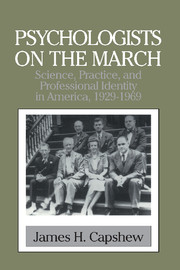Book contents
- Frontmatter
- Contents
- Acknowledgments
- List of Abbreviations
- Introduction: The Psychologists' War
- Interlude I
- 1 Growing Pains: After the Great War
- 2 Mobilizing for World War II: From National Defense to Professional Unity
- 3 Home Fires: Female Psychologists and the Politics of Gender
- Interlude II
- 4 Sorting Soldiers: Psychology as Personnel Management
- 5 Applied Human Relations: The Utility of Social Psychology
- 6 From the Margins: Making the Clinical Connection
- 7 Engineering Behavior: Applied Experimental Psychology
- Interlude III
- 8 A New Order: Postwar Support for Psychology
- 9 Remodeling the Academic Home
- Interlude IV
- 10 The Mirror of Practice: Toward a Reflexive Science
- 11 Beyond the Laboratory: Giving Psychology Away
- Interlude V
- Epilogue: Science in Search of Self
- Index
10 - The Mirror of Practice: Toward a Reflexive Science
Published online by Cambridge University Press: 06 July 2010
- Frontmatter
- Contents
- Acknowledgments
- List of Abbreviations
- Introduction: The Psychologists' War
- Interlude I
- 1 Growing Pains: After the Great War
- 2 Mobilizing for World War II: From National Defense to Professional Unity
- 3 Home Fires: Female Psychologists and the Politics of Gender
- Interlude II
- 4 Sorting Soldiers: Psychology as Personnel Management
- 5 Applied Human Relations: The Utility of Social Psychology
- 6 From the Margins: Making the Clinical Connection
- 7 Engineering Behavior: Applied Experimental Psychology
- Interlude III
- 8 A New Order: Postwar Support for Psychology
- 9 Remodeling the Academic Home
- Interlude IV
- 10 The Mirror of Practice: Toward a Reflexive Science
- 11 Beyond the Laboratory: Giving Psychology Away
- Interlude V
- Epilogue: Science in Search of Self
- Index
Summary
In September 1939, just after the war in Europe broke out, Gordon Allport delivered his presidential address at the annual meeting of the American Psychological Association, held at Stanford and Berkeley, California. Reflecting on the historical symbolism of meeting for the first time on the shores of the Pacific, he noted that events across the Atlantic had placed “the burden of scientific progress in psychology” on the profession. Faced “with the responsibility for the preservation and eventual rehabilitation of world psychology,” the Harvard professor asked, “Are we American psychologists equipped for the versatile leadership demanded by our comprehensive discipline?” He proposed to answer his rhetorical question through an analysis of “the psychologist's frame of reference” as it was reflected in the pages of the psychological literature over the preceding fifty years.
Among the trends he observed was a rapid rise in the use of statistics, to the point that nearly half of the published literature relied on them. There was also a noteworthy increase in the use of animals as subjects and a concomitant growth in the proportion of methodological studies of all kinds. His data suggested “the development of a notable schism between the psychology constructed in a laboratory and the psychology constructed on the field of life.” In a footnote, Allport went on to call attention to the unwitting hypocrisy of some academic purists when they criticized applied psychology: “Outside the laboratory he lives a cultured and varied life of a free agent and useful citizen.
- Type
- Chapter
- Information
- Psychologists on the MarchScience, Practice, and Professional Identity in America, 1929–1969, pp. 212 - 240Publisher: Cambridge University PressPrint publication year: 1999

